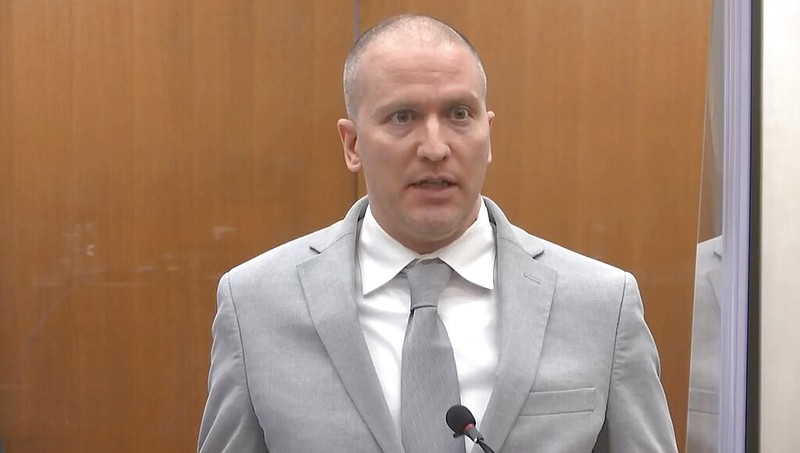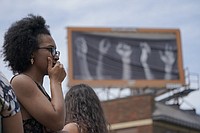MINNEAPOLIS -- Former Minneapolis police officer Derek Chauvin was sentenced to 22½ years in prison for killing George Floyd, whose dying gasps under Chauvin's knee led to the biggest outcry against racial injustice in the U.S. in generations.
The punishment -- handed down after Chauvin broke his yearlong silence to offer condolences to the Floyd family and express hope that they eventually have "some peace of mind" -- is one of the longest prison terms ever imposed on a U.S. police officer in the killing of a Black person.
Floyd family attorney Ben Crump released a statement that said: "This historic sentence brings the Floyd family and our nation one step closer to healing by delivering closure and accountability. For once, a police officer who wrongly took the life of a Black man was held to account."
Still, Floyd family members and others were disappointed. The sentence fell short of the 30 years prosecutors had requested. And with good behavior, Chauvin, 45, could get out on parole after serving two-thirds of his sentence, or about 15 years.
[Video not showing up above? Click here to watch » https://www.youtube.com/watch?v=mSO1rZ5dGSQ]
"Just because it's the most time doesn't mean it's enough time," said Nekima Levy Armstrong, a Minneapolis protest leader.
Judge Peter Cahill went beyond the 12½-year sentence prescribed under state guidelines, citing Chauvin's "abuse of a position of trust and authority and also the particular cruelty" shown to Floyd.
Cahill kept his remarks brief, saying he laid out the basis for the sentence in a court filing based on legal analysis and the facts presented at trial.
"What the sentence is not based on is emotion or sympathy, but at the same time I want to acknowledge the deep and tremendous pain that all the families are feeling, especially the Floyd family," Cahill said at the conclusion of the hearing, which lasted less than 90 minutes. "You have our sympathies and I acknowledge the pain that you are feeling.
Cahill also made clear that his sentence, after many months of sometimes violent civil unrest in the Twin Cities and around the United States, was "not based on public opinion. I am not basing it on any attempt to send any messages. The job of a trial judge is to apply the law to specific facts."
Crump, who represented the Floyd family in a civil action against Minneapolis that yielded a $27 million settlement, said the family had gotten "some measure of accountability" but is hoping Chauvin gets the maximum at his federal civil-rights trial. Crump said this was the longest sentence a police officer has ever received in Minnesota.
But he added: "Real justice in America will be Black men and Black women and people of color who will not have to fear being killed by the police just because [of] the color of their skin. That would be real justice."
'WE'LL TAKE IT'
The sentencing was livestreamed, as was Chauvin's six-week trial that began March 8.
Outside the courthouse, a crowd of about 50 people clasped hands or placed them on one another's shoulders. The reaction was subdued as people debated whether the sentence was long enough. Some cursed in disgust.
At George Floyd Square, as the intersection where Floyd was pinned to the pavement is now known, members of the crowd broke into applause, and several said, "We'll take it."
Chauvin was immediately led back to prison. He showed little emotion when the judge pronounced the sentence. His eyes moved rapidly around the courtroom, his mask obscuring much of his face.
The fired white officer was convicted in April of second-degree unintentional murder, third-degree murder and second-degree manslaughter for pressing his knee against Floyd's neck for up to 9½ minutes as the 46-year-old man gasped that he couldn't breathe and went limp on May 25, 2020.
Floyd was a father and grandfather, and had been a rapper and star football and basketball player in high school in Houston. He had moved in recent years to Minneapolis, looking for a fresh start. In his last years of life, he worked as a security guard at a homeless shelter and a nightclub, and had struggled at times with opioid addiction.
Bystander video of his arrest after a counterfeit $20 bill was used at a corner store prompted protests around the world and led to scattered violence in Minneapolis and beyond, as well as demands for overhauling police departments.
On Friday, Chauvin, who did not testify at his trial, removed his mask and turned toward the Floyd family, speaking only briefly because of what he called "some additional legal matters at hand" -- an apparent reference to the federal trial, where his words could be used against him.
[Gallery not loading above? Click here for more photos » arkansasonline.com/626chauvin/]
"I do want to give my condolences to the Floyd family. There's going to be some other information in the future that would be of interest. And I hope things will give you some peace of mind," he said without further explanation.
Defense attorney Eric Nelson had asked that Chauvin be given probation, saying the former officer's "brain is littered with what-ifs" from that day: "What if I just did not agree to go in that day? What if things had gone differently? What if I never responded to that call? What if? What if? What if?"
Nelson declined to comment when asked what Chauvin meant with his reference to "other information."
Chauvin's mother, Carolyn Pawlenty, pleaded for mercy for her son, saying his reputation has been unfairly reduced to that of "an aggressive, heartless and uncaring person" and a racist.
"I want this court to know that none of these things are true and that my son is a good man," she told the judge, adding: "Derek, I want you to know I have always believed in your innocence, and I will never waver from that."
"I will be here for you when you come home," she said.
TEARFUL FAMILY
Prosecutor Matthew Frank, in asking the judge to exceed the sentencing guidelines, said "tortured is the right word" for what the officer did to Floyd.
"This is not a momentary gunshot, punch to the face. This is 9½ minutes of cruelty to a man who was helpless and just begging for his life," Frank said.
Floyd family members had tearfully asked the judge to impose the maximum, which was 40 years. Several spoke before the sentence, and his 7-year-old daughter, Gianna, was seen in a recorded video.
"I miss you and I love you," Gianna Floyd said in the video when asked what she would say to her dad. She had a long list of things she still would have liked to do with her father: "I want to play with him, have fun, go on a plane ride."
Afterward, Floyd's nephew Brandon Williams said the sentence was insufficient, "when you think about George being murdered, in cold blood with a knee on his neck for 9 minutes and 29 seconds execution-style in broad daylight." LaTonya Floyd, Floyd's sister, said of the punishment: "That's nothing. That's nothing. He should have got the max, period."
The Rev. Al Sharpton said the sentence was significant, yet not exactly justice. "Justice is George Floyd would have been alive," he said.
The concrete barricades, razor wire and National Guard patrols at the courthouse during Chauvin's three-week trial in the spring were gone Friday, reflecting an easing of tensions since the verdict.
Before the sentencing, the judge denied Chauvin's request for a new trial. The defense had argued that the intense publicity tainted the jury pool and that the trial should have been moved out of Minneapolis.
The judge also rejected a defense request for a hearing into possible juror misconduct. Nelson had accused a juror of not being candid during jury selection because he didn't mention his participation in a march last summer honoring the Rev. Martin Luther King Jr. Prosecutors countered that the juror had been open about his views.
'RARE OCCURRENCE'
Philip Stinson, a criminal-justice professor at Bowling Green State University, said 11 nonfederal law officers, including Chauvin, have been convicted of murder for on-duty deaths since 2005. The penalties for the nine who were sentenced before Chauvin ranged from six years and nine months to life behind bars, with a median of 15 years.
Ted Sampsell-Jones, a professor at the Mitchell Hamline School of Law, said Cahill was under "a lot" of public pressure to give close to 30 years.
"Part of what a judge is trying to do is accomplishing deterrence and sending a message ... and that does take into account the impact on the community," Sampsell-Jones said this week. "We have important factors in play that have never been in play before.
"This is a Minnesota case that has received national and international attention unlike any other case in Minnesota. It's a case where the threat of violent response has hung over the entire proceeding. That's highly unusual. You can't deny that those things matter. You can't deny that they have shaped the proceedings at certain points."
Cahill said in his memorandum: "Part of the mission of the Minneapolis Police Department is to give citizens 'voice and respect.'" But Chauvin, the judge wrote, had instead "treated Mr. Floyd without respect and denied him the dignity owed to all human beings and which he certainly would have extended to a friend or neighbor."
With Chauvin's sentencing, the Floyd family and Black America witnessed something of a rarity: In the small number of instances in which officers accused of brutality or other misconduct against Black people have gone to trial, the list of acquittals and mistrials is longer than the list of sentencings after conviction.
In recent years, the acquittals have included officers tried in the deaths of Philando Castile in suburban Minneapolis and Terence Crutcher in Tulsa.
"That's why the world has watched this trial, because it is a rare occurrence," said Arizona civil-rights attorney Benjamin Taylor.
Chauvin has been held since his conviction at the state's maximum-security prison in Oak Park Heights, where he has been kept in a cell by himself for his own protection, his meals carried to him.
The three other officers involved in Floyd's arrest are scheduled for trial in March on state charges of aiding and abetting both murder and manslaughter. They also will stand trial with Chauvin on the federal charges. No date has been set.
Information for this article was contributed by Amy Forliti, Steve Karnowski, Aaron Morrison, Stephen Groves, Tammy Webber, Angie Wang and Mohamed Ibrahim of The Associated Press; by Chao Xiong, Paul Walsh and Jessie Van Berkel of the (Minneapolis) Star Tribune (TNS); and by Tim Arango of The New York Times.












